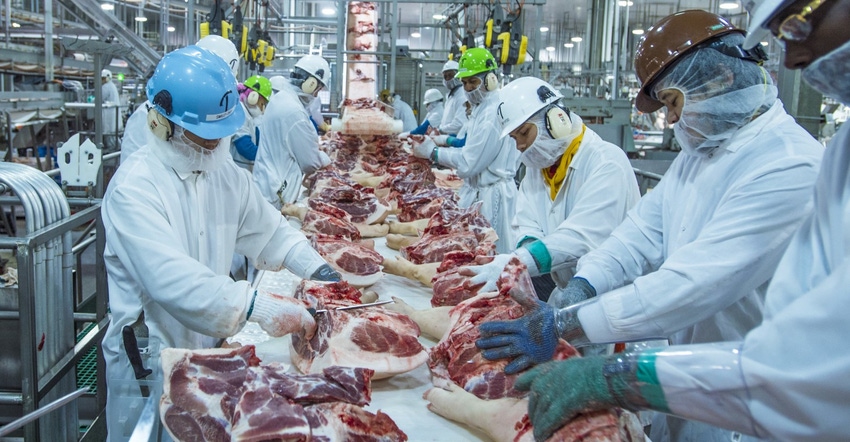Organizations file brief stating NSIS violates food safety laws
New Swine Inspection System aims to improve food inspection process; USDA maintains final inspection accountability and authority.
January 19, 2022

National food-policy and consumer organizations have filed a motion asking for a federal court to rule on a case involving the USDA's New Swine Inspection System. In a joint release, the Center for Food Safety and Food and Water Watch, say that the case, filed in 2020 (Center for Food Safety, et al. v. Sonny Perdue, No.4:20-cv-00256-JSW (N.D. Cal) ) concerns NSIS implementation that "greatly undermines the ability of federal inspectors to protect consumers from foodborne illnesses."
In the brief to the U.S. District Court for the Northern District of California, the organizations, along with the Humane Farming Association, argue that the 2019 rules violate the Federal Meat Inspection Act.
"The Trump administration implemented this outrageous self-policing initiative that hands over inspection duties to meat companies themselves — even though 48 million Americans get sick every year due to foodborne illness," said Zach Corrigan, senior attorney for Food and Water Watch and lead counsel in the case. "Enough is enough. We are asking a federal court to throw out the unlawful rules the Biden administration continues to defend."
A court order issued by the U.S. District Court for the District of Minnesota vacated the part of the USDA final rule eliminating line speed limits for NSIS establishments. As a result, all NSIS establishments are currently required to operate at line speeds that do not exceed 1,106 head per hour.
FSIS, in collaboration with the Occupational Safety and Health Administration, has developed a "time-limited trial" that will enable establishments to experiment with ergonomics, automation and crewing to create custom work environments that will protect food and worker safety while increasing productivity. During the trial, participating establishments will be permitted to operate at an increased line speed for a period of up to one year during which time they will collect data that measures the impact of line speed on workers. �
The Food and Water Watch and Center for Food Safety argue that the "NSIS program relies in large part on meat company employees conducting inspections instead of government inspectors, a radical departure from long-established practice." The brief states this "raises significant dangers to public health: for example, an examination of USDA data showed that the plants that had piloted the new system had significantly more regulatory violations for fecal and digestive matter on carcasses than traditional plants. Since the government projects widespread adoption of the NSIS rules (plants producing over 90% of the U.S. pork supply), these policies will greatly impact consumers."
NSIS has been part of continuous effort by FSIS to ensure a safe supply of wholesome American pork, according to the National Pork Producers Council. A voluntary program supported by many years of research, NSIS aims to improve the inspection process by shifting FSIS employees' responsibilities to focus on inspection duties more directly related to food safety and animal welfare (like plant sanitation and humane handling). In turn, pre-inspection sorting and quality control tasks would be delegated to plant employees on the line. Final inspection accountability and authority, however, remains with the USDA.
The North American Meat Institute also addressed these concerns when the new program was initially released. Under NSIS, plant employees conduct certain manual labor tasks so FSIS inspectors can focus on more technical food safety tasks, which is a more appropriate use of an inspector's time and expertise. However, inspectors still have oversight of the employee-performed tasks. Inspectors, also, continue to inspect 100% of live animals prior to slaughter and all carcasses after slaughter.
In a response to a 2019 NBC News story entitled: "Inspectors Warn Unsafe Pork Could Make its Way to Consumers Under Trump Rule Change," NAMI said:
"America's meat and poultry packers and processors have every incentive to ensure their products are safe. Food safety is the number one priority in both NSIS and traditional pork plants.
"Over the last 50 years, huge advancements in food science, animal handling and meat processing have been embraced and deployed by the meat and poultry industry. In that time, incidence of certain pathogens and injuries to workers have decreased dramatically.
"In both NSIS and traditional systems, facilities may not operate in a way that jeopardizes food safety or worker safety. 100 percent of all animals and carcasses are inspected by a Food Safety and Inspection Service (FSIS) federal inspector. FSIS inspectors have the authority to slow or stop the production line at any time. Line speeds are routinely adjusted to compensate for things like staffing shortages and other variables."
You May Also Like



